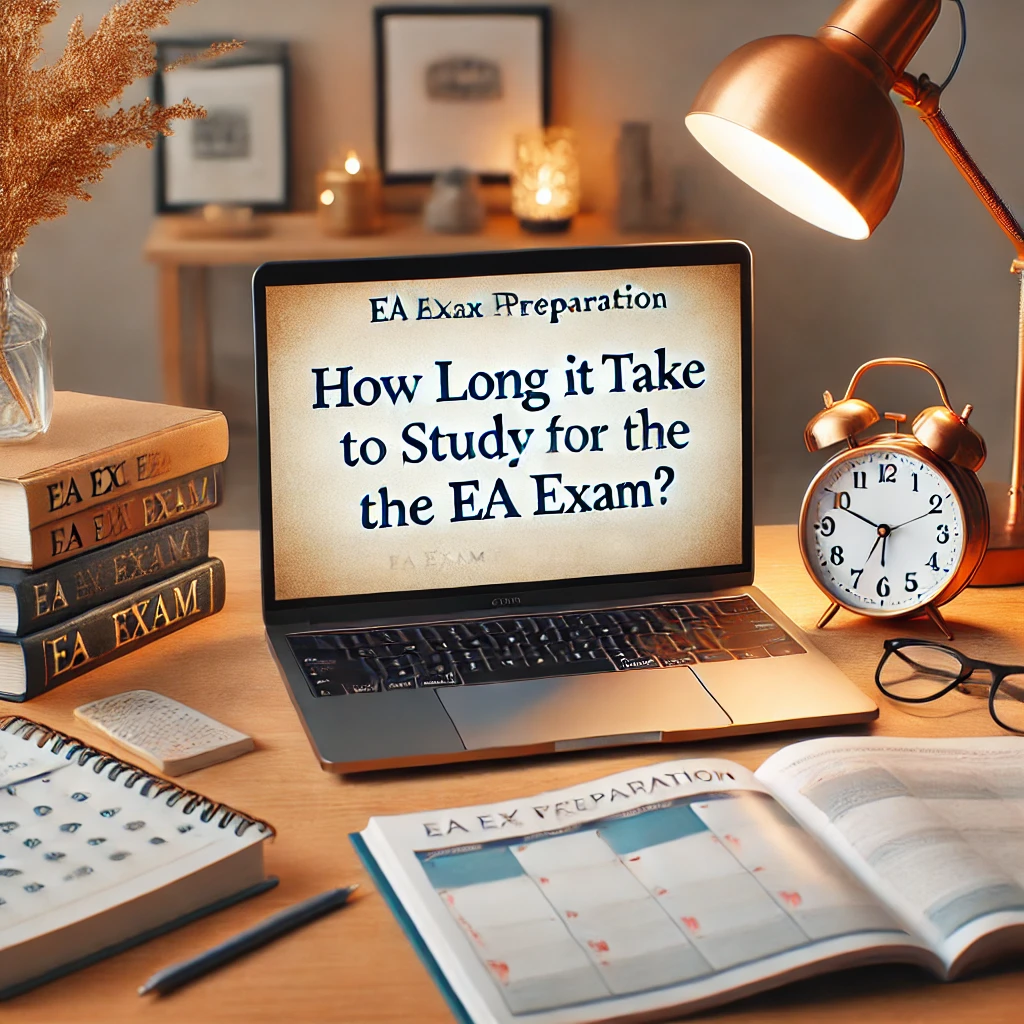The Enrolled Agent (EA) exam is an important and crucial milestone for tax professionals who wish to represent the clients before IRS. This exam evaluates a candidate’s understandings related to tax law, ethics and procedures, requiring through preparation. However, it is a common question among the candidates that, “How long does it take to study for the EA exam?” The answer is that, the duration depends on different factors including study methods, previous knowledge and personal habits. This article highlights these important features that are helpful for the candidates when preparing for the EA exam.
Understanding The Structure of the EA exam
Before determining timelines, it is important to analyze the structure of the EA exam and point them out. This exam consists of three main parts that are:
Part 1: Individuals – This section involves the tax policies and regulations that would concern the individual taxpayers.
Part 2: Business – This part describes the tax process for business and related issues.
Part 3: Representation, Practices and Procedures – This section covers the IRS procedures and practices, along with the representation matters.
Candidates have the power to take parts in any order. This allows them to tailor their study schedules.
Factors That Influence Study Time
1. Prior Knowledge and Experience
One of the most important factors that affect the preparation time is the candidate’s knowledge and experience related to the tax subjects.
Experienced Professionals: The candidates that already work or have worked in tax, specifically with individual or business returns only need about 50 to 100 hours of focused study for each part. This is because they have already experienced such cases and their familiarity with tax concepts help them to speed up their learning process.
Newcomers to Taxation: In contrast, the individuals who are new to this field, may require a preparation time between 100 to 150 hours or more for each part.
2. Study Method and Resources
The method chosen has a great impact on the preparation time. Different strategies and methods open different learning styles for the candidates. The resources selected by the candidates also makes this process long or short depending on the material.
Self-Study: Most of the candidates prefer independent study using their textbooks, IRS publications and online resources. While this is more reasonable method, it may also take longer as you thoroughly check the material by yourself.
Review Courses: On the other hand, many candidates choose structured revie courses that are either available in-person or online. These courses typically involve lectures, practice exams and study materials. Depending on the strength of the course, candidates can complete their study in roughly 60 to 100 hours for each part.
Practice Exams: Involving practice exams into your study routine is an important task. This helps you to reflect on your learning and makes you familiarize the exam format. You should take out specific time from your routine to solve these practice tests.
3. Personal Study Habits
Every candidate has its own study routine. This individual study routine has a great effect on the preparation time like:
Consistency: Consistency is the key. Regular study sessions, such as 1-2 hours a day, are generally more effective than leaving things for last minute. You should always try to make an effective study schedule that helps you to focus on your tasks.
Distractions: The study environment matters a lot. A quiet, clean and dedicated space improves your focus and efficiency which ultimately helps you to finish things quickly.
Time Management: Balancing study with work and professional commitments can be challenging. Set realistic goals and stick to a schedule for achieving better success.
4. Exam Date and Scheduling
The time available before the exam date will affect the study plan. The EA exam is offered year-round, giving candidates the freedom to choose their exam dates based on their availability and preparation.
Short-term Preparation: If the exam date is approaching quickly, candidates may need to intensify their study efforts, dedicating 20-30 hours per week in the weeks leading up to the exam.
Long–term Preparation: Candidates with several months to prepare can spread their study sessions out, allowing for deeper comprehension and reducing stress.
5. Recommended Study Timelines
Based on the factors discussed, here are some suggested study timelines:
For Candidates with Tax Experience
Total Study Time: Approximately 150-250 hours for all three parts combined.
Study Schedule:
Part 1: 50-100 hours (4-6 weeks)
Part 2: 50-100 hours (4-6 weeks)
Part 3: 50-100 hours (4-6 weeks)
For Candidates with Limited Experience
Total Study Time: Approximately 300-450 hours for all three parts combined.
Study Schedule:
Part 1: 100-150 hours (6-8 weeks)
Part 2: 100-150 hours (6-8 weeks)
Part 3: 100-150 hours (6-8 weeks)
Tips for Effective Study Preparation
- Create a Study Plan: Outline a schedule, detailing specific topics to cover each week. Following this plan can help keep you on track.
- Utilize Multiple Resources: Combining textbooks, online courses, videos, and practice exams caters to different learning styles and reinforces understanding.
- Join Study Groups: Collaborating with peers can provide motivation and a broader perspective on challenging topics.
- Practice Regularly: Taking practice exams under timed conditions builds test-taking stamina and helps identify areas needing improvement.
- Take Breaks: Incorporating regular breaks can help maintain focus and prevent burnout, ultimately enhancing productivity.
Conclusion
Preparing for the EA exam require a significant commitment and thoughtful planning. The time taken for this study varies for the individuals depending on their way of learning, previous knowledge and learning styles. The above-given steps and methods provide the whole information about an effective study routine for EA exam preparation. Also, the investment of time and effort pays off at the end. This enables the candidates to handle the EA exam with confidence and advance their careers in the tax-related fields.
Frequently Asked Questions (FAQs)
How many hours should I plan to study for the EA exam?
The average study time can range from 150 to 300 hours for all three parts combined. Candidates with prior tax experience may need around 150-250 hours, while those without experience might require 300-450 hours.
Can I study for all three parts at the same time?
While it’s possible to study for all three parts at once, it’s often more effective to focus on one part at a time. This allows for deeper understanding and better retention of the material.
What is the best study schedule?
A consistent study schedule is key. Many candidates find that studying 1-2 hours a day, several days a week, works well. Spreading study sessions over several months can enhance retention.
Found this helpful? Don’t miss out on our other great articles!



